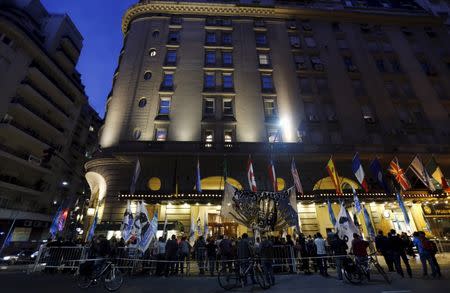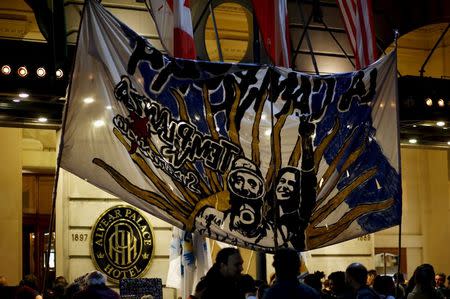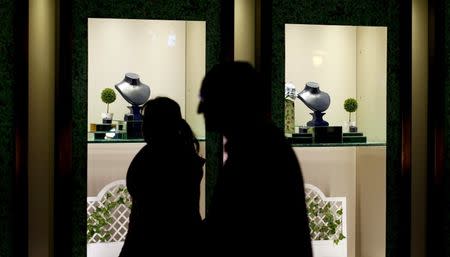Argentina's middle class doubt election will reverse nation's decline
By Sarah Marsh BUENOS AIRES (Reuters) - In the affluent Recoleta neighborhood of Buenos Aires, where grand 19th century buildings hark back to an era of prosperity, middle class voters fear a presidential election on Sunday will do nothing to halt Argentina's long decline. "We always hope things will change for the better but they just get worse. This used to be a rich country," said Lucila Novillo, 53, who has struggled to keep her interior design business afloat over the past four years as tight capital controls virtually paralyzed the real estate market. All the leading candidates in the race to succeed leftist President Cristina Fernandez have promised reforms to ease the interventionist policies that her opponents and investors say have choked the economy. Yet the front-runner is ruling party candidate Daniel Scioli, who has Fernandez's backing and is broadly supported by poorer Argentines who benefit from expanded subsidies under her government. Scioli offers the least amount and slowest pace of change. Many middle class voters like Novillo, who will cast her ballot for opposition candidate Mauricio Macri, fear Argentina's problems are too deep-rooted for any one president to fix and will keep dragging it down regardless who wins. Despite vast natural resources and a well-educated workforce, the South American country has steadily declined from its perch as one of the world's richest nations in the 1930s, lurching from one financial crisis to the next. While Argentina remains Latin America's third largest economy, its next government will inherit a host of woes from double digit inflation and precarious foreign reserves to last year's debt default. "We should be a great country. We have brilliant, well-educated and creative people," said Novillo. "These qualities should help us grow, but corruption prevents that. The roots of corruption have reached into every corner of this country." Most of Fernandez's cabinet members face corruption allegations, authorities are investigating a possible money laundering scheme at a luxury hotel her family owns, and her vice president is being tried for abuse of power. The justice system often fails to clean up such cases, many Argentines complain, fostering a lack of confidence in the country's institutions. PERONISM TO BLAME? Recoleta's middle-class and wealthy residents reminisce about Argentina's heyday when Buenos Aires was known as the "Paris of the South" and complain about its economic decline and what they perceive as worsening crime, healthcare and education. "Our public education used to be excellent, people came from all over Latin America to study at Argentine universities," said Eduardo Jesus Zimmermann, 84, a former banking executive. "Now Argentines head to the United States, England or elsewhere abroad because public universities are a disaster." Many put the country's decline down to Peronism, the fragmented populist movement that has dominated politics since the first presidency in the 1940s of Juan Peron, who won hero status for his fiery nationalism and defense of workers' rights. "We've been going downhill for 70 years since Peron," said Zimmermann, on his way to a meeting of landowners. But Peronism remains Argentina's most potent political force and Peronist parties have won nine of the 11 presidential elections they have contested. With Scioli, they appear primed to win another. Zimmermann said Peronist power structures, such as its hold over trade unions and Congress, would make it hard for his preferred candidate, the pro-business Macri, to make the necessary reforms even if he won the presidency. Macri has campaigned on a platform of change, promising to dismantle capital controls and trade restrictions from his first day in office to win investor confidence and bring hard currency into the dollar-starved economy. While his pledges are popular among the urban middle class, voters in low income neighborhoods fear he will cut generous welfare benefits introduced by Fernandez. Those neighborhoods, often densely populated, are ruling party strongholds and might carry Scioli to victory without even needing a second round runoff vote. Polls show Scioli close to the 40 percent threshold that would be enough for him to win outright providing he has a lead of 10 percentage points over Macri, a strong probability. For some, the chance of real change is just too small to wait around for. Delfina Raffo, 30, said she was leaving Argentina next month, following in the footsteps of friends and cousins in search of a brighter future elsewhere. High taxes and the stagnant economy forced her to close her Recoleta clothes boutique earlier this year. Two robberies at gun-point made the decision easier and she plans to move to Singapore which is safer and where she believes she can earn more. "I feel we are just going to continue on the same path we've been going along ... with ever more poverty, and the middle class being pulled lower," Raffo said. (Editing by Kieran Murray)




